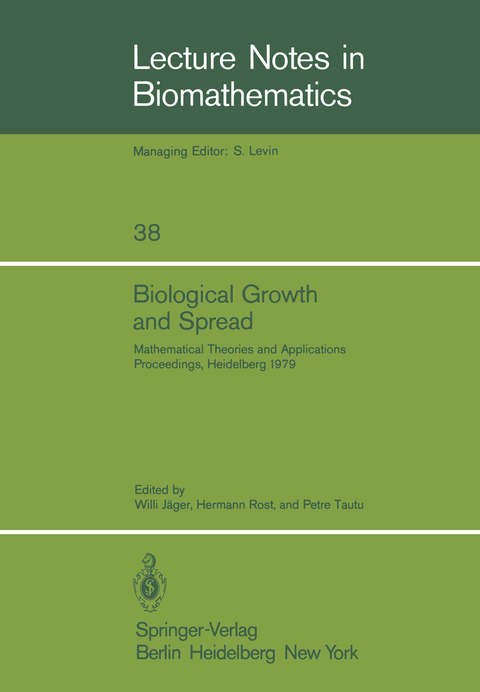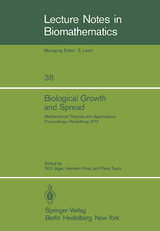Biological Growth and Spread
Springer Berlin (Verlag)
978-3-540-10257-1 (ISBN)
Topic I. Proliferation, Spread and Reaction-Dispersal Processes.- Discussion by the Editors.- Ia. Biological Aspects.- Genetic basis of biological growth.- Some observations on the kinetics of haemopoietic stem cells and their relationship to the spatial cellular organisation of the tissue.- Proliferative cell populations in surface epithelia: biological models for cell replacement.- Ib. Mathematical Aspects and Applications.- Density dependent Markov population processes.- A model of development of a cell.- Spatial spread in branching processes.- Pattern formation by bacteria.- Random processes in random environments.- Segregation model and its applications.- Positive recurrence of multi-dimensional population-dependent branching processes.- Population growth with large random fluctuations.- Niche overlap and invasion of competitors in random environments.II. The effects of demographic stochasticity.- Behavior of limiting diffusions for density-dependent branching processes.- Topic II. Random Systems with Locally Interacting Objects.- Discussion by the Editors.- IIa. Theory.- Local interactions with a global signal: a voter model.- Interacting Markov processes.- On a class of branching processes on a lattice with interactions.- IIb. Models.- The asymptotic behavior of a probabilistic model for tumor growth.- An Ising model of a neural network.- Embryogenesis through cellular interactions.- Biological interpretation of a random configuration model for carcinogenesis.- Topic III. Spatial Models in Epidemiology and Genetics.- Discussion by the Editors.- On the spatial spread of a pattern.- Spatial models in the epidemiology of infectious diseases.- Population controlled spread and intensity of diseases in wildlife.- Clines in a discrete time model in population genetics.-Clines induced by variable migration.- Asymptotic behavior of the solutions of the Fisher equation.- Random walks and probabilities of genetic identity in a tree.- Travelling-front solutions for integrodifferential equations II.- Some mathematical considerations of how to stop the spatial spread of a rabies epidemic.- Some deterministic models for the spread of genetic and other alterations.- Topic IV. Models for Cell Motility.- Discussion by the Editors.- Orientation of cells migrating in a chemotactic gradient.- Theoretical models for the specific adhesion of cells to cells or to surfaces.- Chemotaxis in bacteria: a beginner's guide to the literature.- Assessing the Keller-Segel model: how has it fared?.- Modeling chemosensory responses of swimming eukaryotes.- Mathematical model for tissue inflammation: effects of spatial distribution, cell motility, and Chemotaxis.- Mathematical theories of topotaxis.- Topic V. Stochastic Versus Deterministic Approaches.- Discussion by the Editors.- Connections between stochastic and ordinary integral equations.- Relationships between stochastic and deterministic population models.- Remarks on limit theorems for partial differential equations with random coefficients.- Topic VI. Further Mathematical Approaches and Techniques.- Discussion by the Editors.- Topological techniques in reaction-diffusion equations.- Percolation.- Some ergodic theorems for spatial processes.- Percolation models in two and three dimensions.
| Erscheint lt. Verlag | 1.10.1980 |
|---|---|
| Reihe/Serie | Lecture Notes in Biomathematics |
| Zusatzinfo | XI, 511 p. 4 illus. |
| Verlagsort | Berlin |
| Sprache | englisch |
| Maße | 170 x 244 mm |
| Gewicht | 865 g |
| Themenwelt | Informatik ► Weitere Themen ► Bioinformatik |
| Mathematik / Informatik ► Mathematik ► Algebra | |
| Mathematik / Informatik ► Mathematik ► Angewandte Mathematik | |
| Naturwissenschaften ► Biologie ► Mikrobiologie / Immunologie | |
| Naturwissenschaften ► Biologie ► Zellbiologie | |
| Schlagworte | Bacteria • Biologisch-mathematisches Modell • Biology • Cancer • Cancer Research • Cell • epidemiology • Gene • Genetics • growth • Kinetics • Mathematics • Migration • Population Genetics • Stem Cells • tissue |
| ISBN-10 | 3-540-10257-4 / 3540102574 |
| ISBN-13 | 978-3-540-10257-1 / 9783540102571 |
| Zustand | Neuware |
| Informationen gemäß Produktsicherheitsverordnung (GPSR) | |
| Haben Sie eine Frage zum Produkt? |
aus dem Bereich




